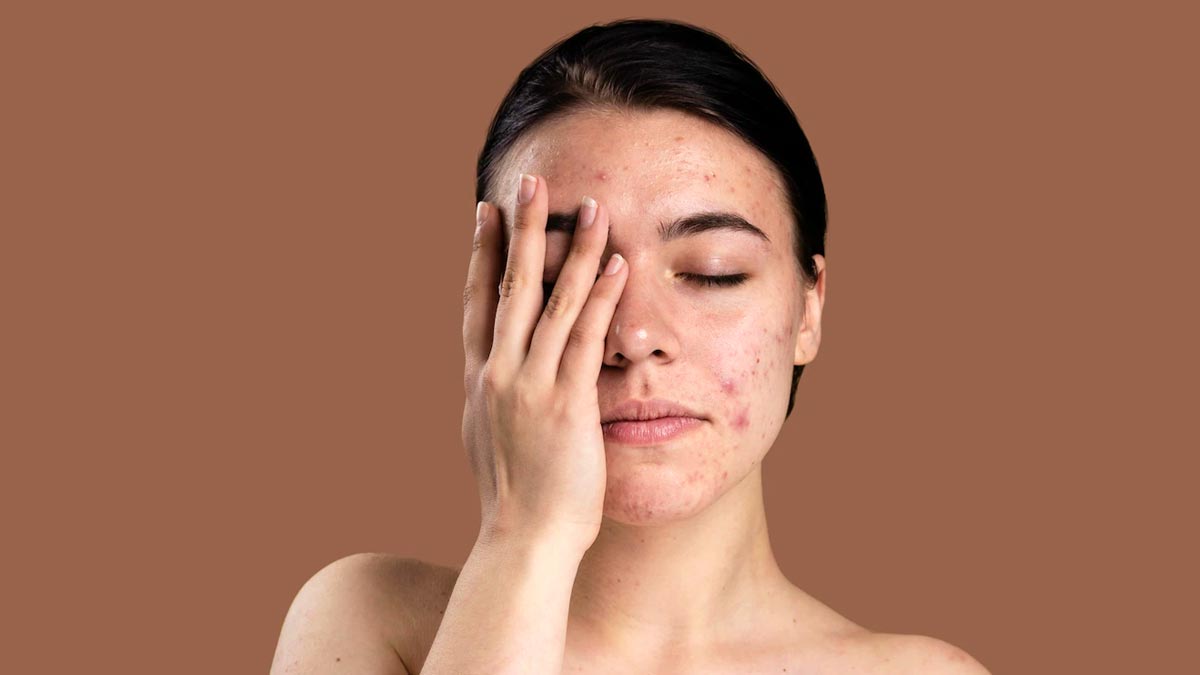Interestingly, Polycystic Ovary Syndrome (PCOS) may affect up to five million women in the US. If you struggle with symptoms including weight gain, difficulty losing weight, acne, missed or irregular periods, thinning hair, extra hair on the face and chest, and fertility problems, you are not alone.
Untreated PCOS can have long-term effects like diabetes, heart disease, high blood pressure, sleep apnea, and possibly even strokes. As if we don’t already have enough to cope with. Additionally, PCOS is linked to a higher incidence of anxiety and depression.
What is PCOS?
PCOS is a female reproductive hormone imbalance that can start as soon as your first period.
What’s happening in the body is that there are too many androgens (male hormones), which is a sign of this hormonal imbalance. Yes it’s true, women have small amounts of androgens, but our body s meant to keep them in balance with our female hormones.
A problem arises when these hormones become imbalanced creating problems with the ovaries, and often leading to issues with your menstrual cycle, frequently seen as missed or irregular periods. Unfortunately, these changes can lead to increased incidence of infertility.
The ovaries of women with PCOS frequently produce cysts, which are little sacs filled with fluid.
How is PCOS diagnosed?
- Physical and pelvic exam – to assess for enlarged ovaries, or other signs of increased androgens
- Ultrasound – determines if ovarian cysts are present (although this can be normal for women to have cysts on their ovaries), or an increased number of follicles
- Blood test – to check hormone/testosterone levels; this should also contain fasting blood sugar, HbA1c, fasting insulin
What are the symptoms of PCOS?
- Missing or irregular periods (not ovulating regularly)
- Acne (specifically on the jawline, chest, and back)
- Oily skin and hair
- Weight gain around the waist
- Inability to lose weight
- Unwanted face and chest hair
- Loss of hair or thinning
- Difficulty getting pregnant
- Insulin resistance and dysregulated blood sugar (though not in every case)
- Darkened skin patches
There are four types of PCOS:
1. Insulin-resistant PCOS – Around 70% of women with PCOS have this kind, making it the most prevalent. In essence, insulin resistance occurs when the body has higher-than-normal levels of insulin, or hyperinsulinemia. This occurs when our cells become a little “numb” to the effects of insulin, causing the pancreas to secrete increasing amounts of the hormone until the cells understand what is happening. You can have trouble losing weight, carry extra weight in your stomach or belly, crave sugar, and have symptoms like fatigue or mental fog if you have this type of PCOS. High insulin levels cause increased androgen levels, resulting in problems like excess hair growth, male pattern hair loss, and acne.
The key to treating insulin resistant PCOS is to increase insulin sensitivity. What you can do:
– Exercise – Your body burns sugar, builds muscle, and becomes more sensitive to insulin with regular exercise and movement throughout the day.
– Keeping blood sugar levels in check requires staying away from meals high in sugar and eating a diet low in carbohydrates but high in protein and fat.
– Putting sleep first and minimising stress can also aid in controlling insulin and blood sugar levels.
– Supplementing with essential nutrients including berberine, NAC, inositol, chromium, and magnesium can be very beneficial. Always consult with your ND prior to supplementation to determine your specific needs.
2. Inflammatory PCOS – Chronic inflammation causes the ovaries to produce too much testosterone, which leads to physical discomfort and problems ovulating. Headaches, joint discomfort, unexplained exhaustion, eczema, and IBS are all indications of inflammation in this form of PCOS. A blood test will typically reveal elevated inflammatory markers, such as a high CRP (C reactive protein) above 5. Other tests, such fasting glucose and insulin, are within the normal range but can show variations due to inflammation.
Key to treating Inflammatory PCOS treatment:
– Address gut health. Reducing systemic inflammation requires supporting damaged gut tissue, restoring gut flora balance, enhancing digestive enzymes, and getting rid of harmful bacteria.
– Eliminate food sensitivities. A crucial step in reducing inflammation is addressing any food sensitivities and eliminating foods that cause it.
– Natural anti-inflammatories like turmeric, omega 3 fatty acids, and antioxidants like NAC can be used.
3. Adrenal PCOS – Around 10% of persons with the diagnosis have this kind of PCOS, which is brought on by an aberrant stress reaction. High levels of testosterone and androstenedione are typically absent, and DHEA-S, another form of androgen produced by the adrenal glands, will typically be raised alone.
Key to Adrenal PCOS treatment:
-Stress management. Your neurological system and your hormones will benefit if you reduce your stress through practises like yoga, meditation, mindfulness, and journaling.
_ Sleep. To assist your stress levels and recovery, make sure you receive at least 8 hours of sleep every night.
– Avoid doing any vigorous exercise. Limit your excessive and intense training because this can further tax your adrenal glands.
– Avoid caffeine in coffee, tea, and carbonated beverages.
– Herbals including liquorice, rhodiola, and withania, can aid in the body’s ability to adapt and recover from stress. Magnesium, vitamin B5, and vitamin C are other nutrients that are crucial for supporting the brain system and adrenal glands.
4. Pill-induced PCOS – Some people who quit taking the oral contraceptive pill develop post-pill PCOS. In this type, symptoms like acne, irregular periods, or excessive hair growth weren’t present prior to using the birth control pill. This type of PCOS is due to the type of synthetic progestins used in oral contraceptives. After stoping the BCP, there can be changes to the ovaries and a natural increase in androgens, which might create the classic symptoms of PCOS; however, there is no insulin resistance in this variety. This type of PCOS can heal on its own in 3-6 months after stopping the BCP. As a naturopathic doctor, I optimize hormone metabolism by supporting liver function in these patients.
PCOS can be difficult to navigate alone. Remember that it is a complex hormonal disorder that can take time to resolve. If you would just like to manage your PCOS symptoms naturally, book an appointment to get your hormonal health properly addressed.





